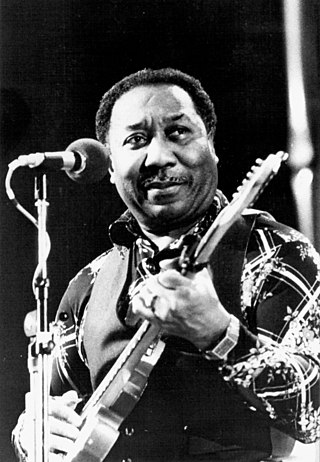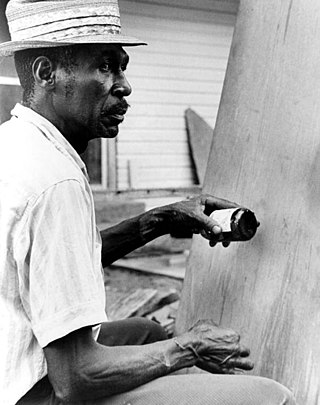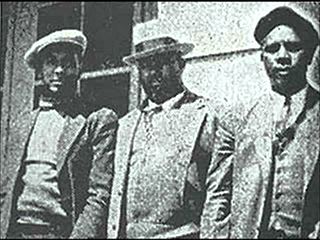
William James Dixon was an American blues musician, vocalist, songwriter, arranger and record producer. He was proficient in playing both the upright bass and the guitar, and sang with a distinctive voice, but he is perhaps best known as one of the most prolific songwriters of his time. Next to Muddy Waters, Dixon is recognized as the most influential person in shaping the post–World War II sound of the Chicago blues.

McKinley Morganfield, known professionally as Muddy Waters, was an American blues singer and musician who was an important figure in the post-World War II blues scene, and is often cited as the "father of modern Chicago blues". His style of playing has been described as "raining down Delta beatitude".

Booker T. Washington "Bukka" White was an American Delta blues guitarist and singer.

James Milton Campbell Jr., better known as Little Milton, was an American blues singer and guitarist, best known for his number-one R&B single "We're Gonna Make It". His other hits include "Baby, I Love You", "Who's Cheating Who?", and "Grits Ain't Groceries ".
Lonnie Pitchford was an American blues musician and instrument maker from Lexington, Mississippi, United States. He was one of only a handful of young African American musicians from Mississippi who had learned and was continuing the Delta blues and country blues traditions of the older generations.

Morris Holt, known as Magic Slim, was an American blues singer and guitarist. Born at Torrance, near Grenada, Mississippi, the son of sharecroppers, he followed blues greats such as Muddy Waters and Howlin' Wolf to Chicago, developing his own place in the Chicago blues scene.

The diddley bow is a single-stringed American instrument which influenced the development of the blues sound. It consists of a single string of baling wire tensioned between two nails on a board over a glass bottle, which is used both as a bridge and as a means to magnify the instrument's sound.

The Mississippi Sheiks were a popular and influential American guitar and fiddle group of the 1930s. They were notable mostly for playing country blues but were adept at many styles of popular music of the time. They recorded around 70 tracks, primarily in the first half of the 1930s. In 2004, they were inducted into the Mississippi Musicians Hall of Fame.

James "Super Chikan" Johnson is an American blues musician, based in Clarksdale, Mississippi. He is the nephew of fellow blues musician Big Jack Johnson.
Jim O'Neal is an American blues expert, writer, record producer, and record company executive. He co-founded America's first blues magazine, Living Blues, in Chicago in 1970, and wrote the column "BluEsoterica". O'Neal also co-founded Rooster Blues Records and, as of 2007, operated the Stackhouse record label, with bases in Clarksdale, Mississippi, and Kansas City.
Spivey Records was a specialist blues record label founded by blues singer Victoria Spivey and jazz historian Len Kunstadt in 1961. Spivey Records released a series of blues and jazz albums between 1961 and 1985.
Deep Blues: A Musical Pilgrimage to the Crossroads is a British documentary film, released in 1991, and made by music critic and author Robert Palmer and documentary film maker Robert Mugge, in collaboration with David A. Stewart and his brother John J. Stewart. The film provided insight into the location, cast and characteristics of Delta blues and North Mississippi hill country blues. Filming took place in 1990 in Memphis, Tennessee, and various North Mississippi counties. Theatrical release was in 1991 and home video release in the United Kingdom, the next year, as was a soundtrack album. A United States consumer edition came in 2000.

Houston Stackhouse was an American Delta blues guitarist and singer. He is best known for his association with Robert Nighthawk. He was not especially noted as a guitarist or singer, but Nighthawk showed gratitude to Stackhouse, his guitar teacher, by backing him on a number of recordings in the late 1960s. Apart from a brief tour in Europe, Stackhouse confined his performing to the area around the Mississippi Delta.
Joe Willie Wilkins was an American Memphis blues guitarist, singer and songwriter. He influenced his contemporaries Houston Stackhouse, Robert Nighthawk, David Honeyboy Edwards, and Jimmy Rogers, but he had a greater impact on up-and-coming guitarists, including Little Milton, B.B. King, and Albert King. Wilkins's songs include "Hard Headed Woman" and "It's Too Bad."
Willie D. Warren was an American electric blues guitarist, bass player and singer. In a long career, he worked with Otis Rush, Al Benson, Little Sonny Cooper, David Honeyboy Edwards, Baby Boy Warren, Guitar Slim, Freddie King, Jimmy Reed, Morris Pejoe, Bobo Jenkins and Jim McCarty. One of Warren's better-known recordings was "Baby Likes to Boogie".
Briggs Farm Blues Festival is an annual event that takes place near Hazleton, Pennsylvania in the town of Nescopeck, Nescopeck Township, Luzerne County, Pennsylvania since the summer of 1998. The festival is hosted every July on the farmland owned by the Briggs family.
Earwig Music Company is an American blues and jazz independent record label, founded by Michael Frank in October 1978 in Chicago.
Lonnie Shields is an American electric blues singer, songwriter, and guitarist. His primary influence was B.B. King. He has released six albums to date, and one publication described his music as "bewitching, funk-influenced variations on the oldest country blues".
Walter Rhodes was an American blues musician, who recorded briefly in the late 1920s and was unusual in being a blues accordionist and singer from Mississippi. It was reported that Rhodes may have been the oldest Delta musician recorded. Little is known of his life outside of his recordings.









